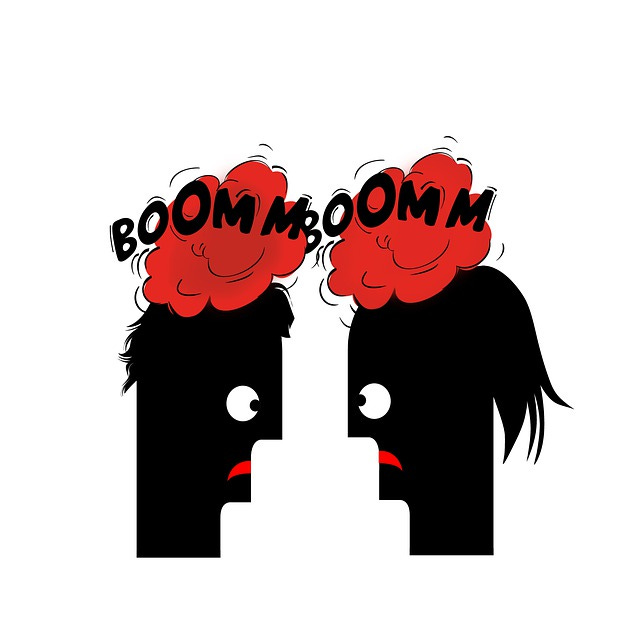When I was a boy growing up in the Bronx (New York City) there was no air conditioning. We looked forward to the weekends when we could go to the movies with air conditioning, and we all got some relief and entertainment for a few hours. During July and August, sleep was difficult, and fans did not help very much. It was a good thing that school ended at the end of June because there was too no air conditioning and it was impossible to concentrate.
Many idioms express the effects of heat. Hell is often viewed as hot. The devil is often painted or portrayed as an evil being holding a blazingly hot pitchfork. The following are more idiomatic expressions about heat:
“It’s hotter than hell.”
“It’s so hot you could fry an egg on the sidewalk.”
"Now don't get hot under the collar."
"Man, there's steam coming out of her ears."
"Sometimes, we have to just sweat it out."
One guy tells another about a gal, "Man, she's hot."
“He should just burn in hell.”
The relationship between mental health, behavior, and weather conditions, particularly heat, is complex and multifaceted. Heatwaves and high temperatures have significantly impacted psychological well-being and human behavior. Understanding these effects requires delving into both physiological and psychological mechanisms.
One of the primary ways heat affects mental health is through its impact on the body's physiological processes. The body's ability to regulate its internal temperature becomes strained when temperatures rise. This can lead to dehydration, heat exhaustion, and, in severe cases, heatstroke. These physical conditions can cause fatigue, dizziness, and confusion, affecting cognitive function and emotional stability. People may experience increased irritability, anxiety, and mood swings as their bodies struggle to cope with the heat.
High temperatures also have a direct effect on sleep quality. Hot weather can make it difficult to fall asleep and stay asleep, leading to sleep deprivation. Lack of sleep is closely linked to a range of mental health issues, including depression, anxiety, and impaired cognitive function. When people are sleep-deprived, they are more likely to experience negative emotions and have difficulty managing stress. This can create a vicious cycle where poor sleep exacerbates mental health problems, which in turn makes it harder to get restorative sleep.
Another significant factor is the psychological stress associated with extreme heat. Heatwaves can disrupt daily routines and limit outdoor activities, leading to feelings of confinement and frustration. People may feel a sense of powerlessness as they try to stay calm and comfortable, especially if they lack access to air conditioning or other cooling resources. This can increase stress levels and negatively impact mental health, particularly for vulnerable populations such as the elderly, young children, and those with pre-existing mental health conditions.
Heat-Aggression Hypothesis:
Moreover, there is evidence that heat can influence behavior more directly. Research has shown that higher temperatures increase aggression and violent behavior. According to the heat-aggression hypothesis, discomfort from heat can lower tolerance levels and increase irritability, which increases the likelihood of conflict and aggressive behavior. Studies have found correlations between heat waves and spikes in incidents such as domestic violence, road rage, and violent crime.
Social factors also affect how heat affects mental health and behavior. During periods of extreme heat, communities face additional stressors such as power outages, water shortages, and increased demand for medical services. These challenges strain social systems and create a sense of community-wide anxiety and tension. Extreme weather conditions make social isolation worse, which worsens mental health issues. Socially isolated people may lack the support systems necessary to cope with the stress of heat waves, making them more vulnerable to the adverse effects on their mental health.
The physiological strain of high temperatures, the impact on sleep, the psychological stress of dealing with extreme heat, and the influence on aggressive behavior all contribute to the overall effect on mental health and behavior.
Hot weather impacts behavior and cognition, demonstrating the severe consequences of high temperatures for human health. When temperatures rise, cognitive performance can decline, affecting decision-making, attention, and overall mental acuity. This decline is partly due to the body's efforts to regulate its temperature, which divert resources from cognitive processes.
People often find it difficult to concentrate in high-heat conditions. The discomfort and physical strain of staying cool can lead to distractions and a reduced ability to focus on tasks. Studies have shown that reaction times slow and error rates increase during heat waves, particularly in tasks requiring sustained attention or complex problem-solving. This diminished cognitive performance can affect various areas of life, including work productivity and academic performance.
Heat also impacts memory function. When the body overheats, the brain's ability to encode, store, and retrieve information can be compromised. This can lead to forgetfulness and difficulty recalling important details, further hampering daily functioning. This can translate into lower performance and increased frustration for students and professionals.
Decision-making is another area where heat exerts a notable influence. Under high temperatures, individuals are more likely to make impulsive decisions and take more significant risks. Heat can impair the prefrontal cortex, the part of the brain responsible for executive functions such as planning, judgment, and impulse control. As a result, people may opt for immediate rewards over long-term benefits, leading to potentially harmful or regrettable choices.
Heat's effects on cognition and workplace behavior can be particularly detrimental. Whether indoors or outdoors, workers exposed to high temperatures may experience reduced productivity and increased error rates. This not only affects individual performance but can also compromise overall workplace safety. In environments such as construction sites or manufacturing plants, where precision and attention to detail are critical, the consequences of heat-impaired cognition can be severe.
Remember, keep a cool head, and smile.







